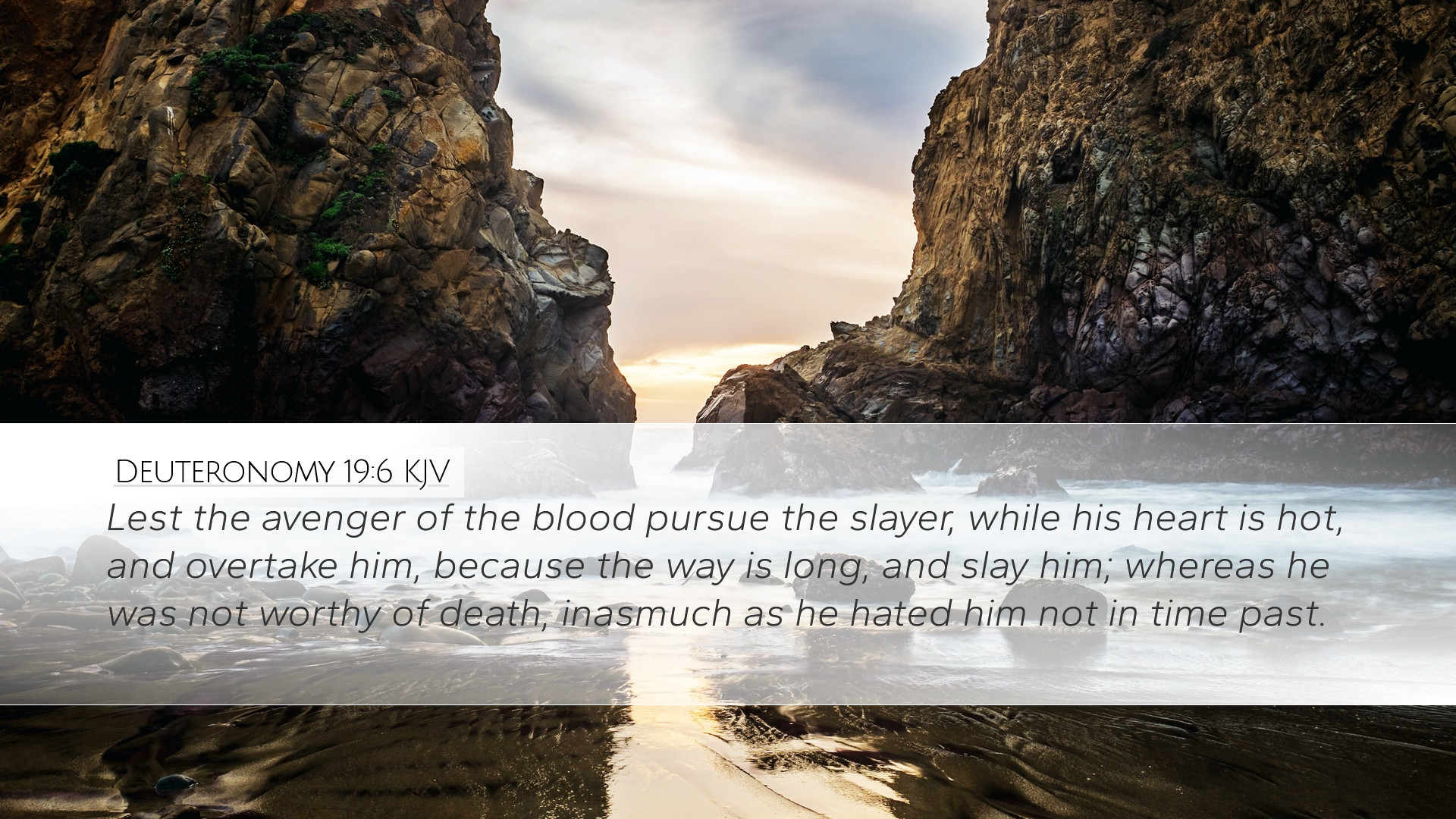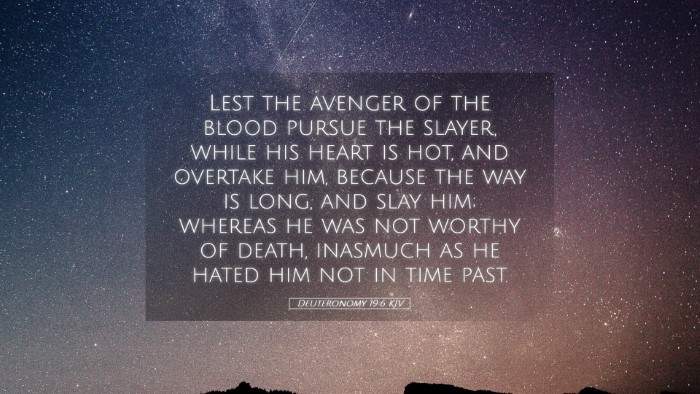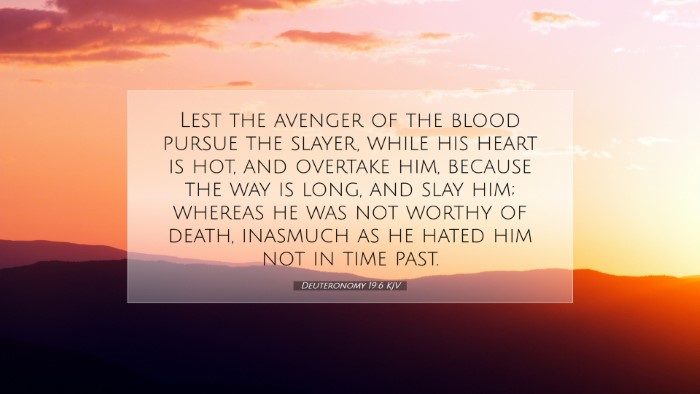Commentary on Deuteronomy 19:6
Verse Text: "Lest the avenger of the blood pursue the slayer, while his heart is hot, and overtake him, because he is not worthy of death, inasmuch as he hated him not in time past."
Introduction
Deuteronomy 19:6 addresses the important legal and moral framework surrounding the concept of manslaughter within the Mosaic Law. This verse carries significant implications for understanding justice, mercy, and the prohibition against blood vengeance. It serves to illustrate the compassion embedded in the Law, protecting individuals who inadvertently cause harm.
Contextual Background
The context of this verse involves cities of refuge established for those who unintentionally kill another person. The cities provide sanctuary from the avenger of blood, highlighting God’s provision for justice without unjust retribution. Understanding the cultural and legal backdrop is vital for interpreting the verse correctly.
Exegesis
The structure of Deuteronomy 19:6 outlines a potential scenario where the avenger of blood, driven by deep emotional distress, might pursue the slayer. The phrase "while his heart is hot" indicates a time of rage and impulsivity, suggesting a critical need for the city of refuge. The text argues that the slayer's lack of wicked intent is essential in determining their innocence or guilt.
Key Themes
- The Avenger of Blood: This figure, often a relative of the deceased, represents a duty to avenge a wrongful death. The law recognizes this role but constrains it within moral limits to prevent personal vendettas that could lead to injustice.
- Unintentionality of the Act: The text emphasizes a distinction between accidental killing and premeditated murder. The Hebrew notion of “not hating” denotes a lack of malice, reinforcing the understanding that intent plays a significant role in determining guilt.
- Protection Offered by the Cities of Refuge: The provision of cities of refuge serves as an act of divine mercy, accommodating human tendencies towards emotional reaction while upholding justice.
Insights from Public Domain Commentaries
Matthew Henry's Commentary
Matthew Henry elaborates on the importance of distinguishing between murder and manslaughter, emphasizing that the Law reflects God's concern for human life and justice. He notes that the avenger's passionate pursuit could lead to a miscarriage of justice if the slayer is not given a chance to defend their innocence. This principle aligns with the broader theological theme of God's mercy, where He provides avenues for justice to be tempered with compassion.
Albert Barnes' Notes
Albert Barnes focuses on the procedural aspects underpinning the ancient judicial system. His commentary stresses the necessity of having effective legal structures in place, such as the cities of refuge, to safeguard individuals from the often irrational nature of revenge. Barnes reminds readers that while the avenger's role stems from a legitimate sense of justice, it can lead to excessive and unintended consequences if not regulated by the Law.
Adam Clarke's Commentary
Adam Clarke emphasizes the emotional volatility experienced in the aftermath of a death, underlining the humanity of the avenger of blood. Clarke points out that the subtle interplay of emotions can cloud judgment, necessitating God’s provision for refuge for the inadvertently guilty. He also expounds on God’s overarching desire for justice combined with mercy, encouraging a balanced approach in human interactions.
Theological Implications
From a theological perspective, Deuteronomy 19:6 illustrates key themes of justice, mercy, and the value of intent in moral decision-making. The instruction provides profound insights into the nature of God's justice system, indicating that while justice is essential, it must be applied with wisdom and compassion.
Impacts on Pastoral Ministry
For pastors, this verse underscores the importance of teaching congregants about the nuances of forgiveness and the need for equitable justice. In situations where conflicts arise, encouraging a pause for reflection can prevent rash actions driven by anger, reflecting the heart of God in handling personal grievances.
Applications for Theology Students
Theological students can gain a deeper understanding of the ethical dimensions of the Law through this verse. It encourages examination of the balance between justice and mercy, leading to critical discussions on how these principles are reflected in Christ’s teachings and their implications for contemporary legal and ethical debates.
Relevance for Scholars
Bible scholars can explore Deuteronomy 19:6 through the lenses of ancient Near Eastern law codes, comparative studies, and theological ethics. Analyzing this verse within its historical, cultural, and literary context offers insights into the evolution of legal thought and the enduring relevance of biblical justice in today’s world.
Conclusion
Deuteronomy 19:6 provides a rich tapestry of meaning and application for various audiences. Its lessons on the unintentionality of actions, the emotional dimensions surrounding justice and vengeance, and the call for compassion in the face of tragedy resonate across theological disciplines. As we reflect on this verse, we are reminded of God's ultimate desire for justice infused with mercy, a principle that should guide our lives and ministries.


